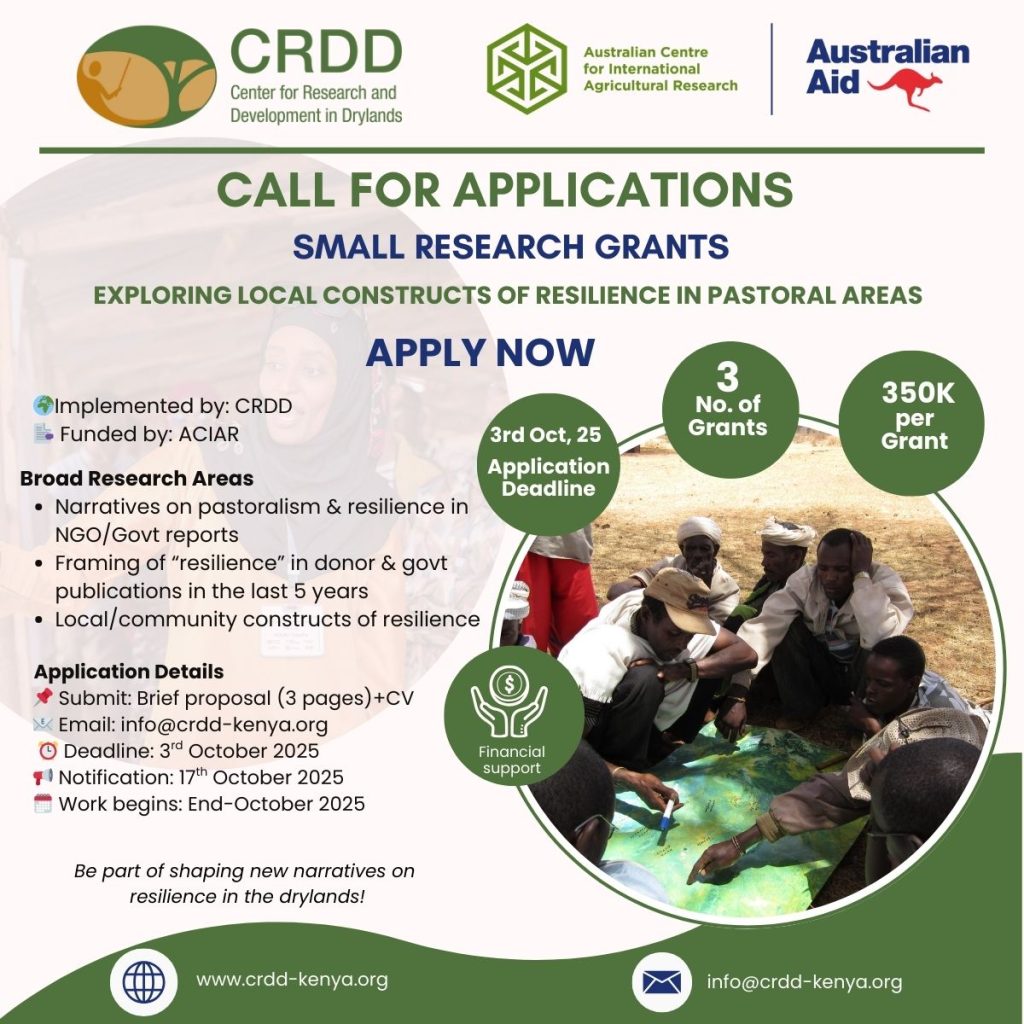Exploring Local Constructs of Resilience in Pastoral Areas
The Centre for Research and Development in Drylands is implementing a research project, “Exploring Local Constructs of Resilience in the Face of Chronic Uncertainty in the Drylands,“ funded by the Australian Centre for International Agricultural Research (ACIAR). This research project aims to identify and explore emerging alternative narratives towards resilience and climate adaptation in drought-affected rangelands and pastoralist areas of Kenya and southern Ethiopia. The project does this through a grounded, locally relevant perspective centred on the support of high reliability professionals and networks in pastoral settings, focusing on the processes through which adaptation and resilience can be achieved.
A team of CRDD-affiliated researchers have been investigating specific research questions across Isiolo and Marsabit in Kenya and the cross-border area of Southern Ethiopia for the last two years. This work includes theoretical, methodological, and practical considerations that have shaped the “Exploring Local Constructs of Resilience” research project and contributed to CRDD’s learning and documentation of resilience in this region. The call for current applications would build upon this work to enhance the collaborative outputs and build on expertise in the field.
This call for applications targets researchers and practitioners to explore thematic areas under this research theme. The goals of these small grants are to redefine how resilience is understood and to provide practical and flexible recommendations for external interventions on pastoralism and resilience in the drylands.
Broad Research Areas
We welcome ideas from researchers on the following broad thematic areas that relate to CRDD’s ongoing work on pastoralism and resilience in the drylands:
- Document the narratives around pastoralism – positive and negative pastoral resilience narratives – in NGO and government reports produced in the past 5 years relating to northern Kenya, categorizing these into different themes.
- Document the framing of ‘resilience’ in different NGO, donor and government publications published in the last 5 years and assess how these framings are affected by the type of organization and how the framings have changed over time. For example, through interviews with different respondents in the counties of Marsabit and Isiolo, identify lessons from the work of programmes and projects by government and non-governmental organizations in pastoral areas focused on ‘resilience’, identifying what has worked and what has not.
- Explore local/community constructs of resilience in different parts of Marsabit and Isiolo counties, presenting quotes from different interviews, with the analysis highlighting differences according to location, gender, age, wealth and other relevant dimensions of difference. This can entail looking at how the traditional social support system has changed and the emergence of new forms of support. For example, identifying and analyzing how village-based support systems are formed and operationalized as fall back during various social functions, school fees, medical emergencies etc.
Outputs
These small grants will be flexible in nature and applicants with innovative ideas to inform new resilience frameworks for pastoral areas are encouraged to apply. The proposed mode of study is through desk review and possible interviews with leading researchers and various networks to gain further insights. Outputs, the exact details of which will be agreed upon during contracting, will include:
- Working paper or report
- A blog, podcast or video recording
The successful applicants will be linked with existing CRDD research team members to draw on the existing work in the project and co-create the process and outputs, including briefs, videos, and working papers.
Application Process
A total of three small grants of a maximum of Kenya Shillings 350,000 each will be awarded to cover the researchers time and logistics.
Applicants should send a brief research proposal (maximum 3 pages) on their topic of interest and their proposed approach and their CV to info@crdd-kenya.org by 3rd October, 2025. Shortlisted applicants will be notified by 18th October, 2025 and will be expected to commence work on the research from end of October.
The proposal should consist of the following items:
- Potential research topic/ working tittle
- Problem statement & justification – relevance and how it is connected to the project thematic areas specified above.
- Research design and methodology
- Possible time frame
- Brief bibliographic reference relating to your research topic.
- A copy of a reference letter from your academic/professional referees should be sent directly to CRDD by the referee via info@crdd-kenya.org
Only shortlisted candidates will be contacted.
This application can be downloaded below.

